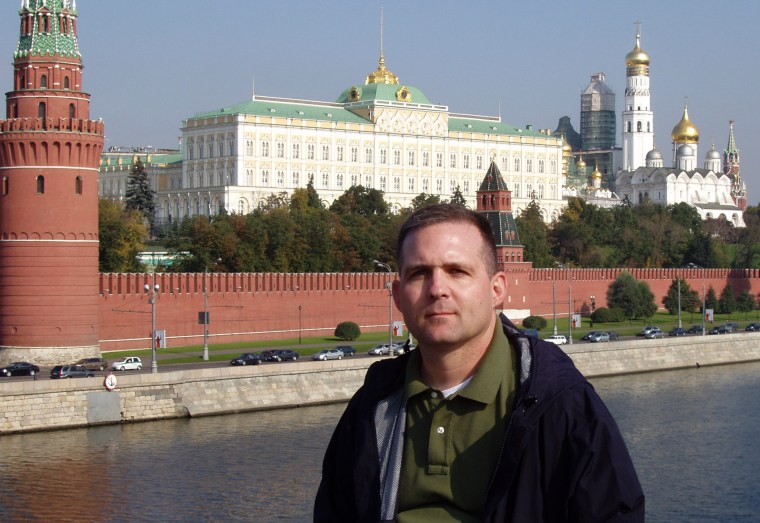The ex-Marine detained in Moscow on spying charges does not fit the blueprint of U.S. espionage in Russia, and is more likely a pawn in an effort to seek leverage over the U.S., intelligence and diplomatic veterans told NBC News Wednesday.
"Knowing what we know, if we had to make a bet, I would say this is (Russian president Vladimir) Putin seizing someone on a pretext," former acting CIA director John McLaughlin said on MSNBC's "Andrea Mitchell Reports."
"He may think this is a way to set up a spy swap."
Paul Whelan, 48, was arrested Dec. 30 on a trip to Moscow that his family says was set up to attend a friend's wedding. He has been charged with spying, though Russian authorities have not explained what they allege he did wrong.
"We are deeply concerned for his safety and well-being," his brother, David Whelan, said in a statement on Twitter. "His innocence is undoubted and we trust that his rights will be respected."
The Russian spying charges carry a prison sentence of up to 20 years.
David Whelan said on MSNBC that his brother was part of a wedding party, and the friend who was getting married had asked him to lead tours around the Kremlin because he had been to Russia before.
"He loves to travel so I wasn't at all surprised that he would be confident going to Russia. He has a law enforcement background, he's got his Marine background, he does corporate security and he's aware of the risks of traveling in certain parts of the world," Whelan said.
Two former CIA officers with decades of experience spying overseas told NBC News it is inconceivable to them that the former Marine was spying for the United States.
"We operate in Russia in the strictest, most careful way," said one of the former officers, who focused for many years on operations in Russia. "Just to meet someone requires weeks of planning."
In fact, he said, spying in the Russian police state is so risky that there are many Russian CIA assets whom the agency will only meet outside of the country.
He added, "We cannot justify using an American without diplomatic immunity, because if they get arrested, they are just trade bait."
Spies working under diplomatic cover simply get sent home if arrested, while those working without it can face decades in prison unless they are traded for a Russian spy in jail in the U.S.
If the U.S. sent someone into Russia under nonofficial cover, the second official said, it would not be someone with a U.S. military background.
It is far more likely, they said, that Russian intelligence services charged Whelan as a spy to use as a bargaining chip, perhaps to offer in exchange for Maria Butina, a Russian national who has pleaded guilty to failing to register as a foreign agent.
Secretary of State Mike Pompeo, in a notably restrained response, said of Whelan, "If it is appropriate, we will demand his immediate return."
The White House and U.S. intelligence agencies have been referring all questions to the State Department since Whelan's arrest, and Pompeo's comments Wednesday were the first substantive answer from the U.S. government.
Whelen's case recalls that of Edmond Pope, an American businessman and retired naval intelligence officer who was convicted of espionage by a Russian court in 2000 and sentenced to 20 years in prison, only to be pardoned months later by Russian President Vladimir Putin.
Pope, a consultant, had worked on naval weapons projects at the Pennsylvania State University Applied Research Laboratory. He and an associate were purchasing technical reports about a special rocket-propelled torpedo from a Russian expert, according to news reports at the time.
Whelan, a former Michigan police officer who served in Iraq, had been to Moscow and St. Petersburg, Russia, according to an article on a Marines web site, and had an account on Russian social media.
Whelan works as the corporate security director for BorgWarner, an automotive parts supplier in Auburn Hills, Mich.
According to military records obtained by NBC News, he received a bad conduct discharge from the Marines in 2008 after being convicted of several charges related to larceny.
That made it even less likely he would be working for any American intelligence agency, McLaughlin said.
After Putin regained the presidency in 2012, the Russian government toughened its foreign agent laws in a way that made it much easier to charge foreigners with spying-related crimes. The new climate made it more difficult for civil society organizations to operate in Russia.
Putin even expelled the U.S. Agency for International Development, the State Department's foreign aid arm.

